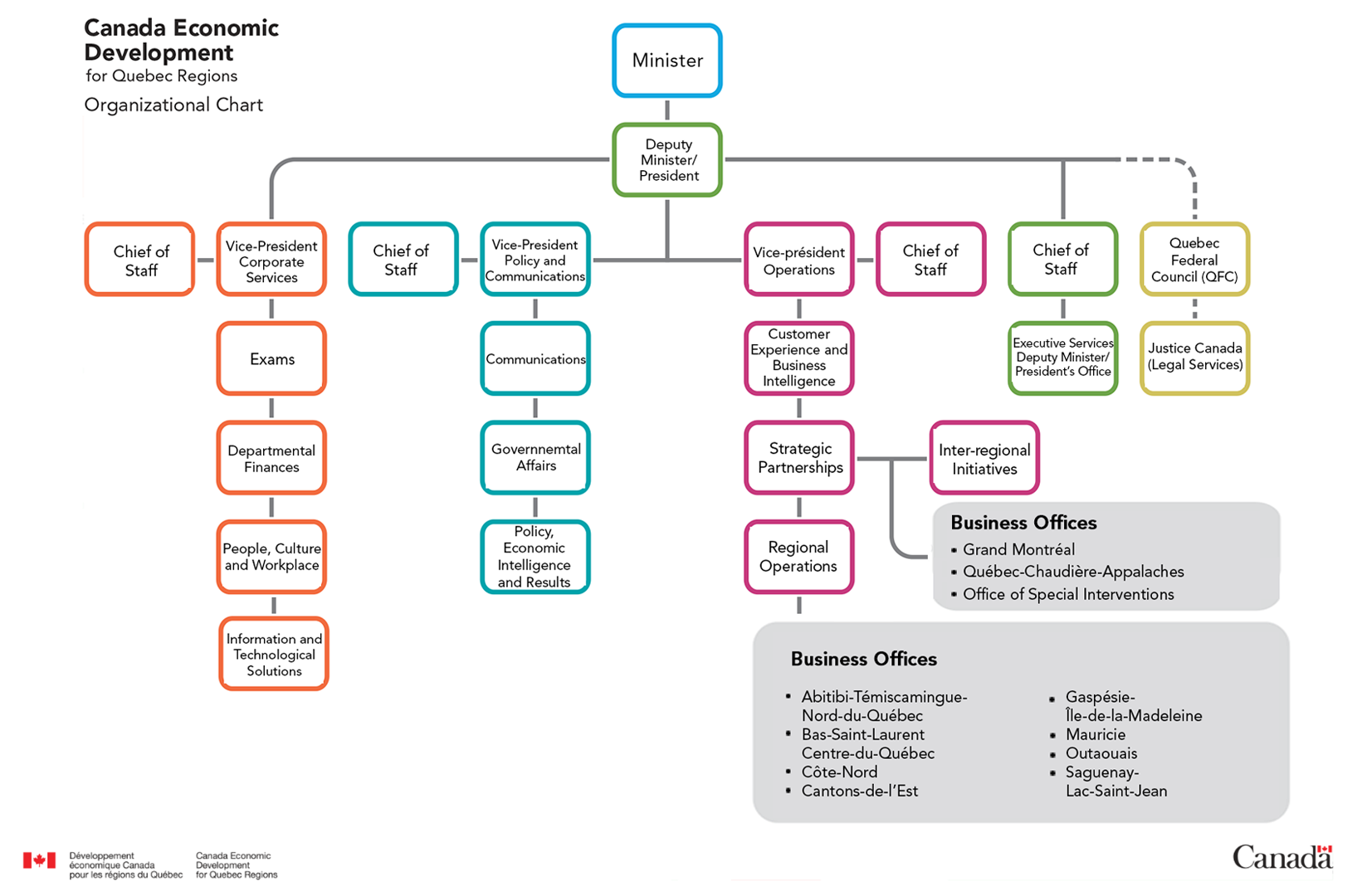
About Canada Economic Development for Quebec Regions
Close to businesses, close to the regions
Raison d'être, mandate and role
Raison d’être
Canada Economic Development for Quebec Regions (CED)’s mission is to promote the long-term economic development of the regions of Quebec by giving special attention to those where slow economic growth is prevalent or opportunities for productive employment are inadequate.
Mandate and role
CED is the key economic development player for Quebec’s regions for small and medium-sized enterprises (SMEs). In order to accomplish its core responsibility, which is economic development in Quebec, CED fosters business start-ups and growth. It helps them become more innovative, productive and competitive. It supports efforts to engage the regions of Quebec and attract investments that will help boost the economic well-being of Quebec and Canada.CED contributes to the economic vitality of all of Quebec’s regions by leveraging their competitive regional advantages, such as wind power and marine technologies. It also supports the transition and diversification of communities that remain dependent on a limited number of sectors or that have been affected by an economic shock, such as the closure of the chrysotile mines.
CED achieves its results by supporting businesses, primarily SMEs, and non-profit organizations (NPOs), through strategic investments. Through its 12 business offices across Quebec’s regions and the relationships it has developed with other economic development players, CED stays abreast of the needs of the regions and businesses and is able to offer financial support to carry out projects that support businesses and communities in their economic development efforts.
Environmental affairs
Canadian Environmental Assessment Act, 2012
Canada Economic Development for Quebec Regions (CED) applies the Canadian Environmental Assessment Act, 2012 to the projects it supports to ensure that they generate no significant environmental impact.- Active public consultations – none currently in progress
Cabinet Directive on the Environmental Assessment of Policy, Plan and Program Proposals
Under the Cabinet Directive on the Environmental Assessment of Policy, Plan and Program Proposals, policy, plan and program proposals of departments and agencies must consider, when appropriate, potential environmental effects.In accordance with this Directive, CED conducted a strategic environmental assessment of the Quebec Economic Development Program.
The Federal Sustainable Development Strategy
The Federal Sustainable Development Strategy is the government’s plan and vision for a more sustainable Canada. It outlines goals and actions to promote clean growth, ensure healthy ecosystems and build safe, secure and sustainable communities
CED’s Departmental Sustainable Development Strategy
Consistent with its mandate and the Federal Sustainable Development Strategy, CED undertakes to finance projects that would help optimize resource use, value residual resources or contribute to eco-efficiency. CED also pledges to shrink the environmental footprint of its operations through green procurement measures, workplace and operational actions and client service measures.
Organizational chart
Deputy Minister / President and Vice-Presidents
- Deputy Minister / President
Sony Perron- Operations Vice-President
Marie-Claude Petit - Policy and Communications Vice-President
Jean-Frédéric Lafaille - Corporate Services Vice-President
Maxime Garon
- Operations Vice-President

Our services
Consulting services
Canada Economic Development for Quebec Regions (CED) provides to businesses, non-profit organizations and communities easy-to-access services based on quality service standards.CED's advisors provide consulting services on:
- CED's funding programs and ad-hoc initiatives;
- partners who may be also able to provide financial assistance;
- prospective partnership opportunities;
- the promotion of the capabilities of Quebec businesses to large companies that are interested in bidding on or have been awarded a contract for a major Crown project (Industrial and Technological Benefits Policy).
Guidance Services
Whether for facilitating the execution of a project or planning a financial package and determining potential sources of funding, CED’s advisor is there to help his or her client in its actions.CED also contributes to the regions’ vitality by assisting communities that are facing transition and adjustment challenges or industries undergoing restructuring.
As needed, CED supports the mobilization, recovery or development of a given sector or a target area.
Information Services
In addition to supporting promising SME projects that generate long-term economic spin-offs, CED also plays a facilitating role by offering information services specifically tailored to small businesses and future entrepreneurs.Through CED's Business Information Services, small businesses and future entrepreneurs have easy access to information on various programs and resources available, as well as market information.